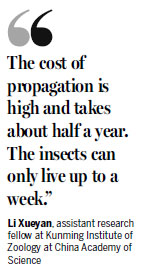Population declines as degraded habitat, bright lights and commercial catches all take their toll
Many people enjoy watching fireflies during the summer, but that pleasant activity could become nothing more than a memory if measures are not taken to reverse a dramatic drop in the insect's population, according to experts.
The species is threatened in China, the result of environmental degradation and the flies being caught for profit.
Li Xueyan, an assistant research fellow at the China Academy of Sciences' Kunming Institute of Zoology, said fireflies are not officially listed as an endangered species in China yet, but the insect's population has seen a sharp decline.
Research on fireflies in China only began around 2002, and the country has a lack of data for comparison to illustrate the status of the species, Li said.
Research by Fu Xinhua, associate professor at Huazhong Agricultural University in Wuhan, Hubei province, who started the Firefly Conservation Research Center, said excessive deforestation and development of tourist attractions has destroyed large areas of natural habitat for fireflies. The center describes the insects as "endangered".
Climate change, light pollution, the use of chemical weed killers, and water and soil pollution are also to blame, a report based on his research showed.

A firefly is an environmental indicator organism whose natural habitat is a cool, dark place with clean water and high humidity. The number of fireflies in a particular area may indicate the quality of the surrounding environment.
Commercial catches are especially worrying, Fu said.
The insects are sold both online and offline in China, with at least 49 shops selling fireflies this year on Taobao, China's leading e-commerce website, an increase of 28.9 percent over last year.
Not all the fireflies sold come from the wild. There are a few artificial propagation centers in China, Fu said, noting that firefly propagation is a highly technical operation, with each firefly costing up to 20 yuan. That suggests that many fireflies sold commercially are not from that group. The price of a single firefly on Taobao is about 2 yuan ($0.30).
In a town in Ganzhou, Jiangxi province, Fu found locals selling the fireflies they catch to a propagation center at prices ranging from 0.3 yuan to 1 yuan. He said the varieties bought and sold didn't differ much from those sold on Taobao.
The zoology institute's Li added: "The cost of propagation is high and takes about half a year. The insects can only live up to a week," Li said. "Artificial propagation is not cost-effective."
"Insects usually have strong reproductive capacity. In the short term, commercial catches may not result in significant damage to the species, but that could change if the practice continues for years," Li said.
Meanwhile, an offline industry chain offers fireflies for sale to scenic areas and parks. Large numbers are purchased to be set free so that visitors can enjoy them.
Fu said he believes that efforts need to be made to raise public awareness about fireflies. The insects could be commercialized, he said, if the process were well planned.
Last year, with the cooperation of the Xianning city government in Hubei province, Fu created a firefly protection zone covering 22 square kilo-meters. In the zone, in addition to cleaning the river, Fu encourages farmers to grow rice without pesticides, fertilizers or weed killers. Light is also managed in the zone.
The efforts have paid off, with the number of fireflies there reaching 500,000 spread across 17 varieties. Fu is also helping a village in Changshu, Jiangsu province, with a firefly protection project.
But no matter what, the public interest should take priority over commercial development, he said.
"As a firefly enthusiast, I spend about six months per year investigating the insects. I will persist in my work, despite the challenges I face," he said. "I know the time I spend on them will pay off."
